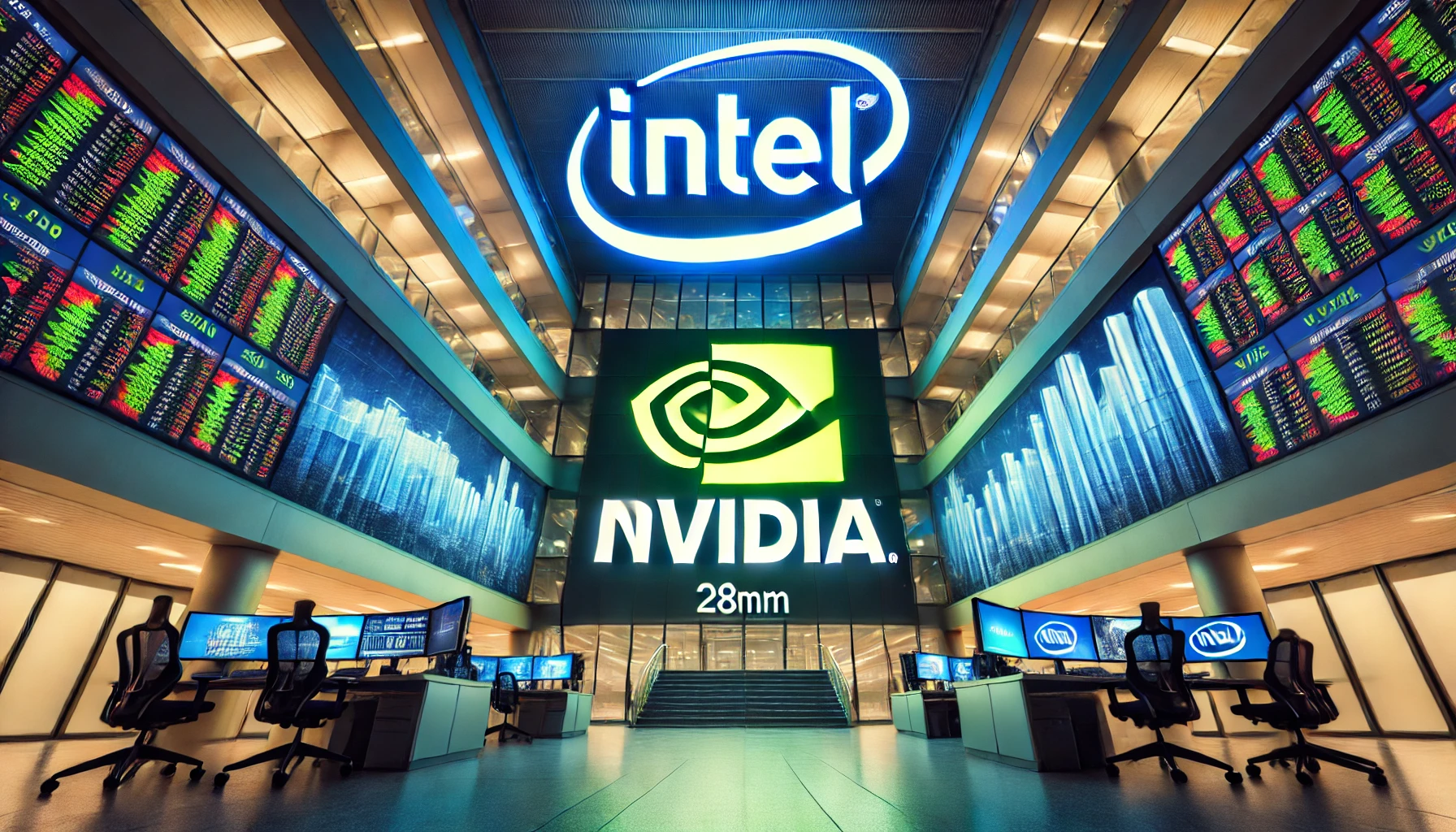
Intel (NASDAQ: INTC) may be removed from the Dow due to underperformance, but Nvidia (NASDAQ: NVDA) isn't the obvious replacement. Market shifts suggest broader implications for the tech sector.
Intel (NASDAQ: INTC) May Face Dow Exit Amid Competitive Pressures, But Nvidia (NASDAQ: NVDA) Might Not Be the Replacement
When companies underperform over long periods or experience significant declines in share price, they may be at risk of removal from prominent indices like the Dow Jones Industrial Average. In this context, Intel (NASDAQ: INTC), whose stock has recently fallen below $20, may be poised to lose its place in the Dow, signaling potential changes in the semiconductor landscape.
Intel's Challenges and Market Movements
Intel, a long-standing leader in the semiconductor industry, was added to the Dow Jones Industrial Average in 1999. However, its stock has struggled significantly over the years. While some companies adapt to changing market dynamics, Intel’s stock has seen a decline of about 49% since its inclusion, with even dividend adjustments unable to offset the downturn.
The pressures Intel faces stem from several factors. First, the rise of graphics processing units (GPUs) for artificial intelligence (AI) applications, led by Nvidia, has left Intel behind in the race for dominance in AI-accelerated data centers. Even with Intel's recent efforts, such as the launch of its Gaudi 3 AI chip, it has struggled to reclaim lost market share.
Second, Intel's attempt to expand into foundry services—building chip-fabrication plants in regions like Ohio and Germany—has placed financial strain on the company. This costly infrastructure development is seen as essential to its strategy but has yet to yield significant returns.
Additionally, competition from Advanced Micro Devices (NASDAQ: AMD) has chipped away at Intel’s dominance in central processing units (CPUs) for personal computers and data centers. Though Intel still holds a majority market share, any loss to AMD in the CPU space translates into reduced revenue, especially during a time when Intel’s foundry services are in early development stages.
Market Sentiment and Intel's Potential Exit from the Dow
Intel’s ongoing struggles, coupled with its diminished market influence, have led to speculation that it could be removed from the Dow. This potential exit reflects market sentiment around its ability to turn its business around in a rapidly evolving semiconductor environment. While Intel has a long-term vision for recovery, including ambitious goals to become a leading foundry by 2030, many analysts believe its path will be lengthy and uncertain.
Should Nvidia Replace Intel in the Dow?
In light of Intel's challenges, Nvidia (NASDAQ: NVDA) has emerged as a potential successor, given its dominance in AI hardware and GPU technology. Nvidia’s AI solutions, particularly its H100 GPU and upcoming Blackwell chip, have cemented its position in data centers worldwide. Moreover, Nvidia's CUDA software platform plays a critical role in the development of AI technologies, keeping businesses dependent on its hardware solutions.
However, despite Nvidia's growing influence, its inclusion in the Dow may not be a certainty. The Dow Jones Industrial Average traditionally favors companies that have demonstrated long-term stability and performance across sectors. There is concern that Nvidia’s significant growth could be driven by the AI boom, which is seen by some as an emerging trend subject to market corrections. Historically, technologies that capture investor attention early on, such as AI, often experience volatility, leading to potential hesitation in adding companies that might be overvalued based on short-term trends.
Additionally, Nvidia's stock split, which reduced its share price after a historic 10-for-1 split, places it in a lower range among the Dow’s components, potentially lessening its influence within the index.
Market and Sector Considerations
The removal of Intel and potential inclusion of another company in the Dow would have broad market implications, especially for the semiconductor and technology sectors. Intel’s exit could symbolize the broader challenges legacy tech companies face in adapting to innovations such as AI, while Nvidia's position reflects the growing importance of AI across various industries, including data centers, autonomous vehicles, and cloud computing.
Despite Nvidia’s dominance in AI, the broader market is showing caution toward the long-term potential of AI technologies, as some companies are still in the early stages of developing clear strategies for monetizing AI.
Broadcom (NASDAQ: AVGO) as a More Suitable Replacement?
While Nvidia is a powerful player in AI, another potential candidate for replacing Intel in the Dow is Broadcom (NASDAQ: AVGO). Broadcom’s more diversified portfolio, spanning wireless chips, networking components, and industrial products, positions it as a company with broad market exposure beyond AI. With its acquisition of companies in cybersecurity and cloud services, Broadcom is seen as a well-rounded choice that could bring more stability and diversity to the Dow, if Intel is indeed removed.
Ultimately, Intel’s potential exit from the Dow and the possible replacement will impact market sentiment and investor confidence, particularly in the technology and semiconductor sectors. Whether Nvidia or another company steps in, the shift will reflect broader changes in market dynamics and the future of AI-driven innovation.
Disclaimer:
The information provided in this article is for educational purposes only and should not be construed as investment advice. estima...
Author
The Editorial Team at estimatedstocks.com is a dedicated group of financial market analysts, researchers, and writers committed to providing accurate, timely, and insightful content for investors and financial enthusiasts. With a deep understanding of global markets, macroeconomic trends, and investment strategies, the team at estimatedstocks.com ensures that readers are well-informed to make smart financial decisions. Our editorial team specializes in analyzing stock performance, market trends, and economic indicators, offering expert commentary and in-depth reports on the ever-evolving world of finance. We aim to bridge the gap between complex financial data and practical investment insights, making the markets accessible to everyone—from seasoned investors to those just starting their financial journey. At estimatedstocks.com, our content is driven by thorough research, critical analysis, and a commitment to delivering objective, fact-based reports. Whether it’s stock market forecasts, company earnings reviews, or sector-specific deep dives, the Editorial Team is focused on helping our audience navigate the financial landscape with confidence. Our mission is to empower investors by providing them with the tools and knowledge to make informed decisions in an unpredictable market.


